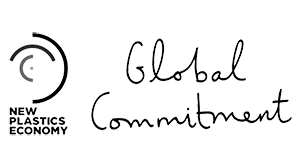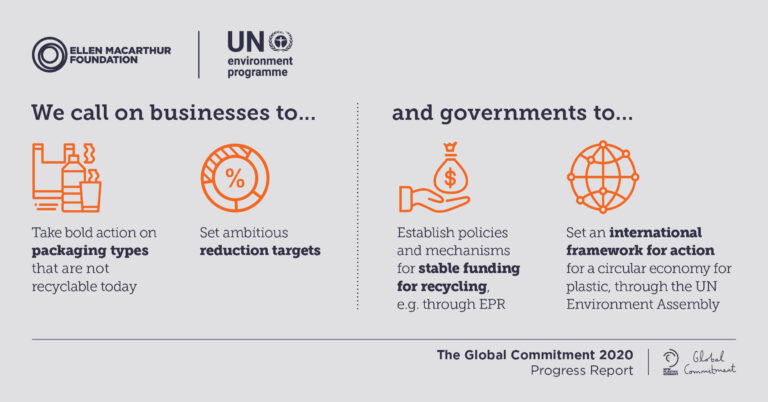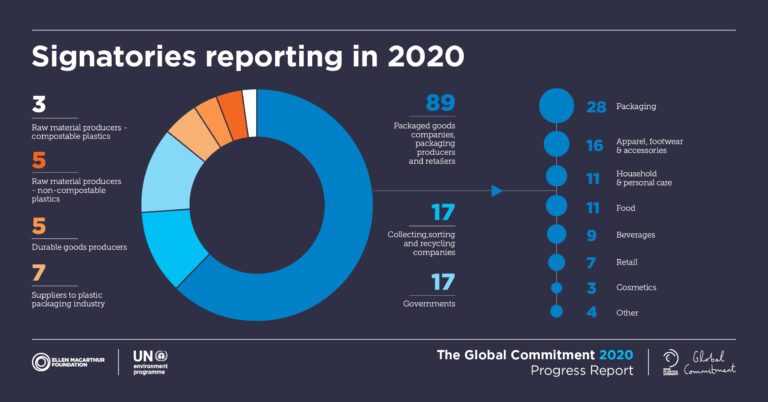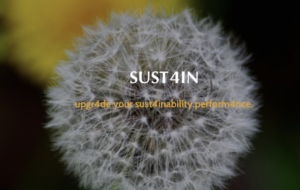Global Commitment 2020 Progress Report
Since 2016, the Ellen MacArthur Foundation’s New Plastics Economy initiative has rallied businesses and governments behind a positive vision of a circular economy for plastics. Its 2016 and 2017 New Plastics Economy reports captured worldwide headlines, revealing the financial and environmental costs of waste plastic and pollution. The initiative is supported by Wendy Schmidt as Lead Philanthropic Partner, and the Oak Foundation as a Philanthropic Funder. Amcor, Borealis, The Coca-Cola Company, Danone, L’Oréal, MARS, Nestlé, PepsiCo, Unilever, Veolia and Walmart are the initiative’s Core Partners.
The Global Commitment is led by the Ellen MacArthur Foundation, in collaboration with UN Environment Programme (UNEP), with its vision now shared by 500+ organisations around the world. At the heart of the Global Commitment is a vision of a circular economy for plastic in which it never becomes waste or pollution. Each signatory formally endorses the vision and will work to eliminate the plastic items we do not need; innovate so all plastic we do need is designed to be safely reused, recycled, or composted; and circulate everything we use to keep it in the economy and out of the environment. Signatories include companies representing 20% of all plastic packaging produced globally, as well as governments, NGOs, universities, industry associations, investors, and other organisations.
The question is not whether a world without plastic pollution is possible, but what we will do together to create it. That’s why we have signed the New Plastics Economy Global Commitment. The Ellen MacArthur Foundation and UN Environment Programme call on companies and governments to eliminate the plastic we don’t need, to innovate so that all plastic we do need is 100% reusable, recyclable, or compostable, and to circulate all the plastic we use. Read the New Plastics Economy Global Commitment 2020 progress report to learn more about what we, and others around the world, are doing to make it a reality.
At the heart of the New Plastic Economy initiative is a vision of a circular economy for plastic, in which it never becomes waste or pollution:
- Elimination of problematic or unnecessary plastic packaging through redesign, innovation, and new delivery models is a priority
- Reuse models are applied where relevant, reducing the need for single-use packaging
- All plastic packaging is 100% reusable, recyclable, or compostable
- All plastic packaging is reused, recycled, or composted in practice
- The use of plastic is fully decoupled from the consumption of finite resources
- All plastic packaging is free of hazardous chemicals, and the health, safety, and rights of all people involved are respected
The 2020 Report shows that while progress has been made between 2018 and 2019, much more must be done, and at greater speed, to achieve the 2025 targets and tackle plastic pollution.
It also reveals substantial differences in progress between signatories – some have taken big steps forward, however others have shown little to no progress against quantitative targets.
Read the New Plastics Economy Global Commitment 2020 progress report to learn more about what we, and others around the world, are doing to make it a reality: http://emf.org/global-commitment

We are a network of expert professionals on sustainability.
SUST4IN apoya:










